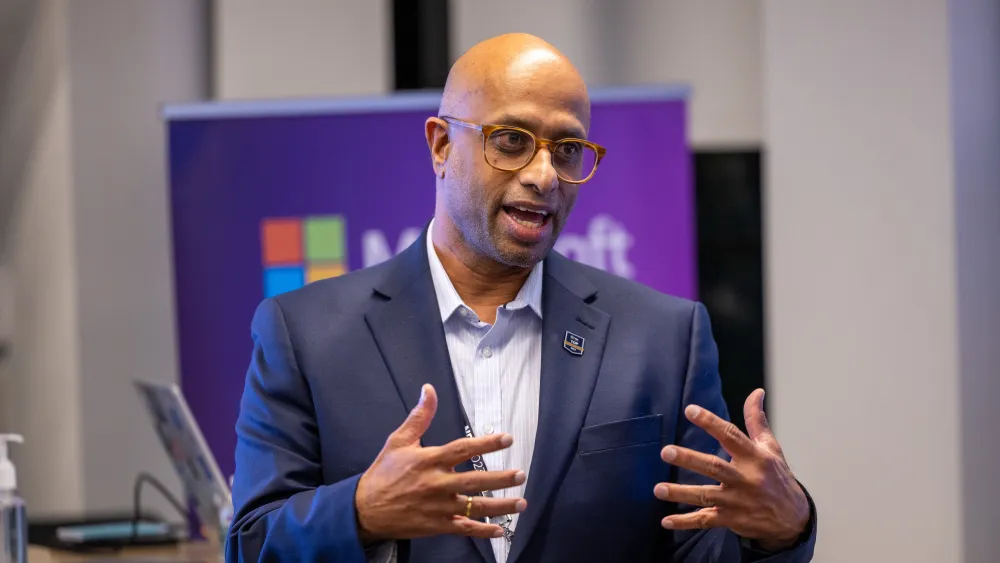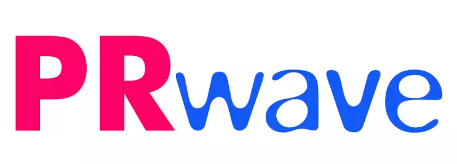ShiSh Shridhar was one of the speakers of GoTech World 2023, an event recommended by PRwave. In this exclusive interview with ShiSh Shridhar we discussed about AI – evolution, trends, and more -, how AI can help businesses of all sizes, AI-generated virtual humans, the biggest AI challenges (including the ethical ones), and many other interesting topics!

Please start by telling us a bit more about you. How did you get to Microsoft and to the division you are now in?
My journey in Microsoft started 26 years ago, as a developer evangelist, tasked with nurturing a community of developers to innovate collaboration platforms.
Over the years, I’ve had the privilege of reinventing myself multiple times. I was part of the visionary team that established the Microsoft Technology Centers worldwide, a testament to our commitment to innovation and collaboration.
My career trajectory took a significant turn when I joined the team that developed Microsoft’s Vertical Industry strategy. I then became part of the Retail and CPG Strategy team, where we shaped Microsoft’s approach to the retail industry.
Working with top-tier retailers and brands worldwide, I found myself not just addressing complex business challenges with technology, but also gaining a deep understanding of the industry.
After nearly two decades in retail, I transitioned into engineering, focusing on Geospatial Intelligence and IoT. This was a new chapter, an opportunity to explore and learn.
Joining Microsoft for Startups felt like a homecoming. It brought together all aspects of my journey – field sales, strategy, engineering – and allowed me to leverage these experiences to help startups scale with the support of Microsoft.
How did things evolve over the past few years at Microsoft – AI related (and beyond)?
Over the past few years, Microsoft has made significant strides in the field of AI. The company shifted its focus to AI a few years after CEO Satya Nadella adopted a “mobile first, cloud first” strategy in 2014. This shift has led to remarkable progress in foundational technologies that have helped to advance human knowledge and create new possibilities to address some of society’s most challenging problems.
In 2022, Microsoft Research established AI4Science, a global organization applying the latest advances in AI and machine learning toward fundamentally transforming science. They also expanded the capabilities of the company’s family of foundation models and worked to make these models and technologies more adaptable, collaborative, and efficient. Furthermore, they developed approaches to ensure that AI is used responsibly and in alignment with human needs.
In addition, Microsoft and OpenAI have a long-standing partnership, which was extended in 2023. This partnership involves a multiyear, multibillion-dollar investment aimed at accelerating AI breakthroughs. As part of this collaboration, Microsoft is increasing its investments in the development and deployment of specialized supercomputing systems to accelerate OpenAI’s independent AI research. Microsoft will also deploy OpenAI’s models across its consumer and enterprise products and introduce new categories of digital experiences built on OpenAI’s technology. Azure, Microsoft’s cloud service, serves as the exclusive cloud provider for all OpenAI workloads. This partnership aims to advance AI research responsibly and democratize AI as a new technology platform.
Microsoft has also brought new capabilities to customers through products and services like GitHub Copilot, an AI pair programmer capable of turning natural language prompts into code, and a preview of Microsoft Designer, a graphic design app that supports the creation of social media posts, invitations, posters, and one-of-a-kind images².
These offerings provide an early glimpse of how new AI capabilities, such as large language models, can enable people to interact with machines in increasingly powerful ways. They build on a significant, long-term commitment to fundamental research in computing and across the sciences.
In addition, Microsoft for Startups has a portfolio of startups driving innovation in AI using emerging technologies including Azure OpenAI.
Let’s discuss a bit more the AI-powered apps and tools that retailers can use. Can you give an example of a company / shop that used a Microsoft Dynamics 365 AI-powered virtual agent? How does it work? What results did they get?
One example of a company that used a Microsoft Dynamics 365 AI-powered virtual agent is HP. HP handles more than 600 million technical support contacts each year, an average of more than 1,000 per minute. Built with the Microsoft Dynamics 365 AI solution, the virtual agent is designed to communicate conversationally and grow smarter over time, giving customers a self-service option and faster fixes.
The AI-powered virtual agent works by using AI and machine learning to understand and respond to customer queries in a conversational manner. It can diagnose customer problems, use the organization’s internal knowledge and vast amounts of data from trusted websites, and supply the agent with an appropriate solution to give to the customer. It’s like having an expert at your fingertips, always ready to assist.
The results of using this AI-powered virtual agent have been significant. It has helped HP provide a faster and more efficient customer service experience. The virtual agent is able to resolve issues faster, handle cases more efficiently, and automate time-consuming tasks so agents can focus on delivering high-quality service to their customers. In a nutshell, it can help every agent to become your best agent.
How does a conversational bot helps retailers and start-ups? What Microsoft programs are used?
Conversational bots, or chatbots, can be incredibly beneficial to both retailers and startups. Here are a few ways they help:
- Customer Service: Chatbots can provide 24/7 customer support, answering frequently asked questions instantly, which improves customer satisfaction and frees up human customer service representatives to handle more complex issues.
- Sales and Marketing: Chatbots can recommend products based on a customer’s browsing history or responses to certain questions, effectively upselling or cross-selling products.
- Data Collection: Chatbots can gather valuable data from interactions with customers, which can be used to improve products, services, and marketing strategies.
Microsoft offers several programs and tools that can be used to build and implement chatbots:
- Microsoft Bot Framework: This is a comprehensive offering that you can use to build and deploy high quality bots for your users to enjoy wherever they are talking.
- Azure Bot Services: This provides the core components for creating bots, including the Bot Framework SDK for developing bots and the bot service for connecting bots to channels.
- LUIS (Language Understanding Intelligent Service): This is a machine learning-based service to build natural language into apps, bots, and IoT devices.
- Azure OpenAI: This uses the OpenAI APIs to enable creation of chatbots.
- Microsoft for Startups: This is a comprehensive global program that delivers access to technology, go-to-market and community benefits that helps startups grow their customer and revenue base. Startups can use the resources and credits provided by the Microsoft for Startups program to develop chatbot applications in addition to other applications.
Another trend is the AI-generated virtual humans – I believe DeepBrain AI has something like that. Is Microsoft creating such virtual humans – or does the company collaborate with other software companies? How do these help retailers?
Microsoft has strategically positioned itself not as a direct builder of industry-specific solutions, but as an enabler of a robust partner ecosystem. This ecosystem is comprised of partners with deep domain expertise across various sectors. These partners leverage the powerful capabilities that Microsoft provides in areas such as cloud computing, security, artificial intelligence, and more.
This approach allows partners to focus their efforts on developing innovative applications tailored to their industry’s needs, rather than having to invest resources in building underlying components for security, reliability, and scalability. This strategy underscores Microsoft’s commitment to empowering businesses through technology, fostering innovation, and driving digital transformation across industries.
This applies to AI Generated virtual humans as well. Microsoft for Startups is partnering with Deep Brain to enable customers with use cases that use Digital Humans. Digital Humans have a variety of use cases in the retail sector:
- Conversational Commerce: Digital humans can embody a brand’s voice, values, identity, and personality for direct, digital shopping experiences. They allow for interactive commerce, where customers are better served, more informed, and more loyal.
- Customer Interaction: Digital humans can create experiences that people want to use. They use natural, easy-to-understand conversation to guide customers through the retail process. Digital Humans are being used in stores as stores associates that have product expertise. In addition, in autonomous stores they can provide the human element to answer questions as well as help find and order products not in store.
- Guidance: They can simplify complex journeys by getting to know your shoppers and guiding them to the products that suit them. Digital Humans are great at providing assistance, answer questions, help find products and more.
- Conversion: By educating and engaging with customers, digital humans build consumer loyalty and trust. They allow retailers and eCommerce brands to serve their shoppers around the clock, without sacrificing the human touch that’s often lost in online shopping.
Digital Humans can be used on kiosks in store, online on commerce sites or in mobile apps to enable a human interaction with customers. Startups are also experimenting with digital humans that can communicate in sign language.
What other AI-based tools/programs does Microsoft have that can help companies/retailers?
Beyond the scope of Microsoft’s AI offerings, such as Azure Cognitive Services and Azure OpenAI services, Microsoft collaborates with a network of partners who possess specialized knowledge in various fields and industries. An example of this is Microsoft for Startups, which engages with a diverse array of Data and AI startups. These startups span a wide range of areas, including generative AI, industry-specific solutions, and developer toolsets.
What are, in your opinion, the biggest AI-related challenges at the moment (technical and ethical)?
AI, while promising, presents several significant challenges, both technical and ethical:
Technical Challenges:
- Data Quality: AI models are only as good as the data they’re trained on. Poor quality or biased data can lead to inaccurate or unfair outcomes.
- Explainability: AI systems, particularly deep learning models, are often referred to as “black boxes” because their decision-making processes are not easily understandable by humans 1.
- Resource Requirements: Training sophisticated AI models requires substantial computational resources, which can be expensive and environmentally unfriendly1.
Ethical Challenges:
- Privacy and Surveillance: AI systems often rely on large amounts of personal data, raising concerns about privacy.
- Bias and Discrimination: If the data used to train AI systems contains biases, the systems themselves can perpetuate or even exacerbate these biases.
- Accountability and Transparency: Determining who is responsible when an AI system makes a mistake can be challenging. Moreover, the decision-making processes of AI systems are often opaque, making it hard to understand why a particular decision was made.
These challenges underscore the need for ongoing research and dialogue in the field of AI. Microsoft has developed a Responsible AI Standard. It’s a framework for building AI systems according to six principles: fairness, reliability and safety, privacy and security, inclusiveness, transparency, and accountability: Microsoft-Responsible-AI-Standard-v2-General-Requirements-3.pdf
Is Microsoft working on other AI-based tools/programs?
Not that I am aware of since my focus is the Startup ecosystem.
What do you think the future holds for AI-powered tools/programs (in your area of expertise)?
As the Global Lead for Retail with Microsoft for Startups, I foresee several exciting developments in the realm of AI-powered tools and programs:
1. Personalized Shopping Experiences: AI will enable retailers to offer highly personalized shopping experiences. By analyzing customer data, AI can provide product recommendations tailored to each customer’s preferences and shopping habits. We will be seeing personal shopping assistants emerge.
2. Inventory Management: AI can help retailers optimize their inventory management, predicting demand for different products and helping to prevent both overstock and stockouts. We will be more automation of inventory, assortment management and replenishment in stores.
3. Virtual Shopping Assistants: AI-powered virtual assistants will become increasingly sophisticated, able to understand and respond to a wider range of customer queries. These digital assistants will enhance the online shopping experience, making it more interactive and engaging.
4. Automated Checkout Systems: AI will enable more retailers to implement automated checkout systems, reducing the need for manned checkout counters and improving efficiency.
5. Predictive Analytics: AI tools will become increasingly adept at predictive analytics, helping retailers anticipate market trends, consumer behavior, and more.
6. Sustainability: AI can also contribute to sustainability efforts in retail, for example by optimizing logistics to reduce carbon emissions, or by helping to minimize food waste in grocery retail.
7. Evolution of the Physical Store: The store will play a critical part in fulfillment as all stores will be part of last mile delivery as well as a location for engaging with customers.
What major changes do you think will happen before 2030-2035?
In the next five years, I see a few disruptions in retail that will be driven by AI:
1. Customer Intelligence: AI will have a big impact on customer intelligence. It will help retailers understand their customers better, predict their needs, and offer personalized recommendations. A great example of a company driving innovation in this area in Romania is one of the Microsoft for Startups partners: Footprints AI
2. Inventory Management: AI can help retailers manage their inventory more efficiently. It can predict demand for different products and help retailers optimize their stock levels. One of the startups that is driving innovation in this area is YDistri from the Czech Republic
3. Chatbots for Customer Service: AI-powered chatbots are expected to play a major role in customer service. They can handle a large volume of customer queries, provide instant responses, and improve the overall customer experience. With more advancement happening this this space, customer expectations will increase and so will technical capabilities to deliver. One of the examples of Startups that is innovating in this space is Deepbrain AI.
4. Cybersecurity: As the adoption of AI increases, so does the risk of cybersecurity breaches. Retailers will need to invest in robust security measures to protect their AI systems and customer data. We are seeing many innovative startups driving innovation in the Microsoft for Startups portfolio.
5. Data Management: Retailers will need to ensure that their data is clean, accurate, and well-tagged to fully benefit from AI. This might involve upgrading legacy systems and complying with data security and privacy regulations. We are seeing several startups in this space including Osmos.
6. Generative AI: Generative AI is expected to revolutionize the retail industry. It will supercharge the capabilities of retailers who have already invested in AI/ML, helping them to operate more efficiently and effectively. Microsoft for Startups is collaborating with startups like Run.AI and Deci.AI to enable efficiencies in the deployment of GenAI.
About ShiSh Shridhar
ShiSh Shridhar is the Global Lead for Retail with Microsoft for Startups, leveraging his expertise to revolutionize the retail industry with cutting-edge innovations. With 26 years of experience at Microsoft, ShiSh is deeply passionate about using Data & AI to solve business problems and gain a competitive edge. His contributions have earned him a spot on Rethink Retail’s Top 100 Influencers and the Retail Technology Influencers Top 100 list for 2022/2023. He serves as an Advisory Board member of the Retail Transformation Center at George Mason University and is a Professional Advisor at the Foster School of Business at the University of Washington. Outside of work, ShiSh has diverse interests in IoT, Ham Radio and Ocean Navigation.



